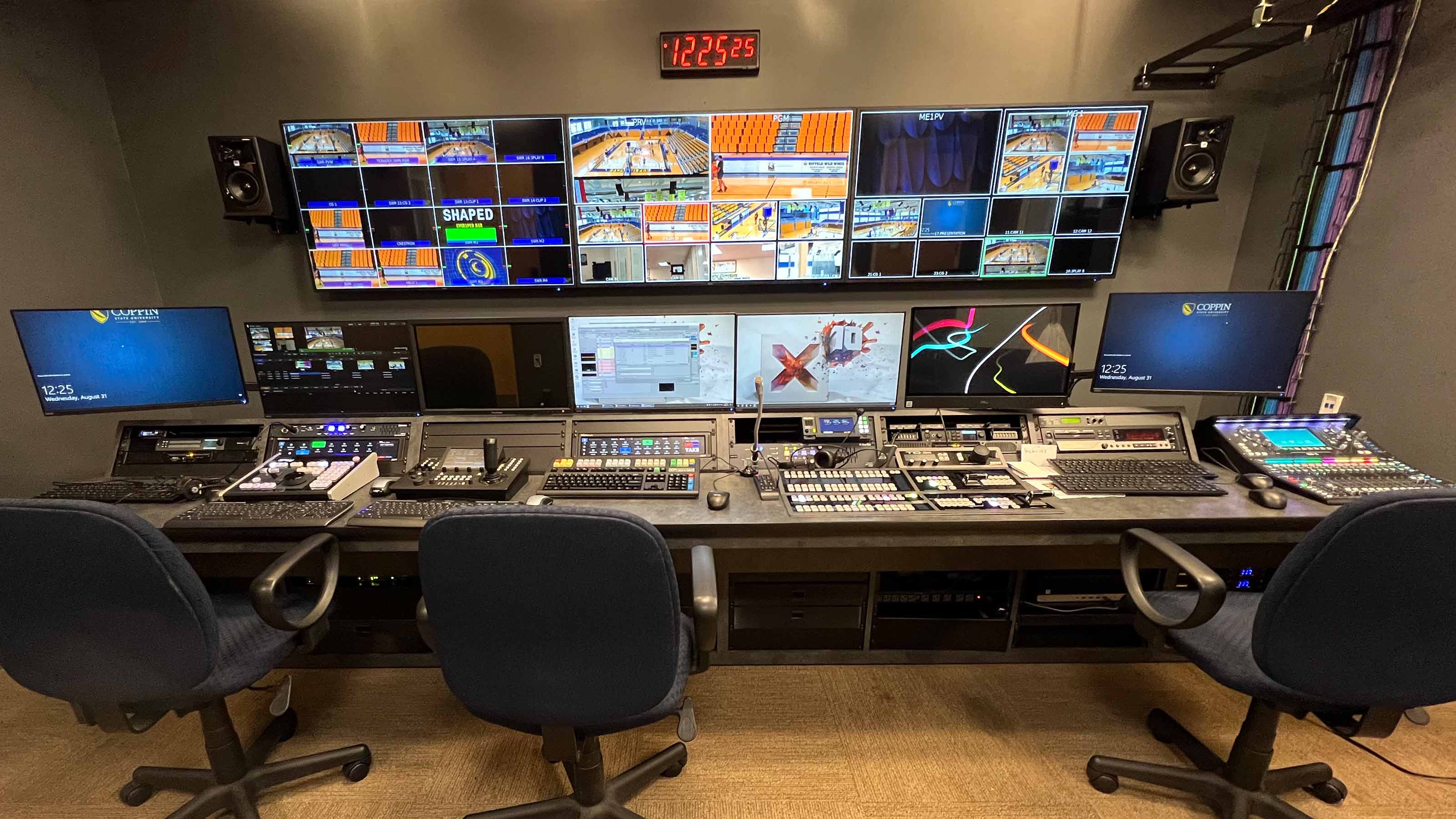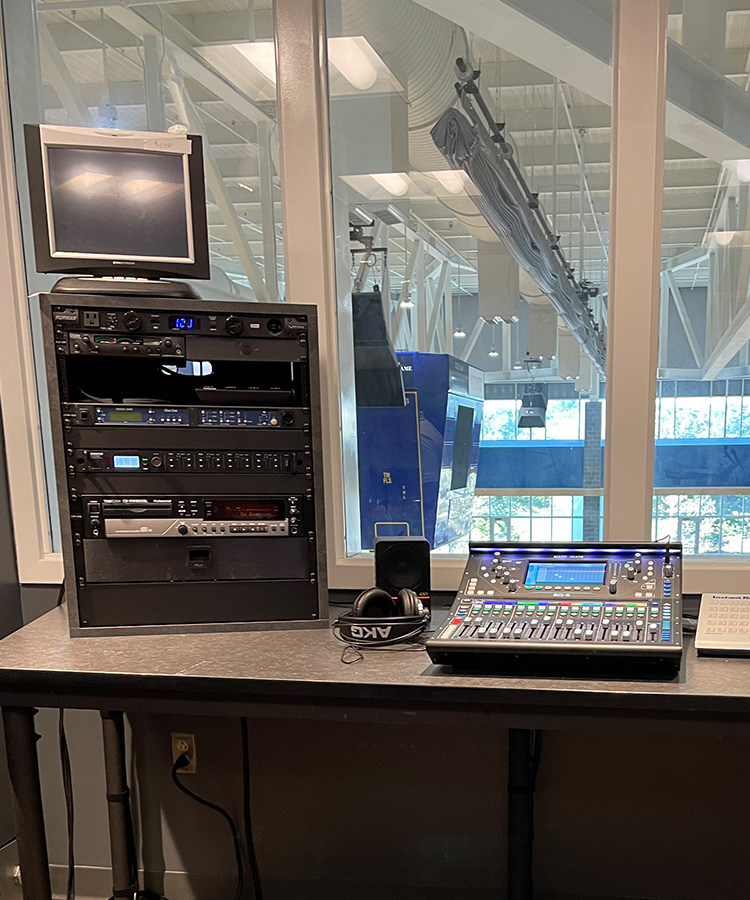
The Coppin State University Physical Education Complex Arena is home to the Eagles basketball and volleyball teams, while also playing host to major on-campus events. It is also a building that was constructed more than 10 years ago—and as the new age of ingesting games through streaming evolved, the production system became outdated.

Located in Baltimore, the 4,100-seat PEC Arena originally opened its doors in Spring 2010 with an SD production system. After a decade’s worth of use, the system was beginning to fail and no longer fit for meeting the production quality of live streaming. CSU was ready to move forward into the HD age, which essentially required a complete overhaul of the control room and cameras for capturing live events. In January 2020, CSU called on David Eisenberg, lead audiovisual/broadcast consultant from GHD’s Virginia office, to begin the process.
Pandemically Challenged Installation
Eisenberg and his GHD team began the project by taking in a basketball game to examine the old production system and begin a needs analysis with the Coppin State staff. According to Eisenberg, GHD researched and workshopped the key broadcast components including cameras, production switcher, video router, graphics, intercom, and more. “As a smaller school,” Eisenberg added, “budget was a key factor in product selection, and best value was our design guidance.”
[Amateur Sports, Professional Sound]
Everything was in place for the arena’s new production system to move forward—and then COVID-19 happened. By mid-March 2020, the project had gone virtual and eventually took a year-long pause until May 2021. In Februrary 2022, CSU selected Digital Video Group to be the broadcast integrator for the project. However, just because the pandemic had cleared enough to allow them to get back to work, many challenges still remained.
“One of the biggest challenges during installation was product availability,” Eisenberg explained. “We did have to do a number of equipment substitutions based on equipment availability, including the audio mixer, playout/recording devices, and terminal equipment. However, most of the key equipment was available.
“Some equipment had last-minute delays by the manufacturer, but the team was able to find workarounds and had a working system for the first home basketball game. While upgrading an existing system can be a challenge on most projects, we were able to use CSU’s summer break to complete the upgrades.”
Setting the Standard
There were several other challenges that lay ahead but were easily resolved. For example, because many CSU games are broadcast on the ESPN+ app, one key requirement was that the system had to be ESPN3 compliant. GHD made sure the system met the standards of the ESPN3 production manual.

All the challenges weren’t solely on the integrators. While the new system was ready for the opening of 2022-2023 college basketball season, the 2022 volleyball season was already underway. The CSU production team, comprised of both CSU staff and students, had to quickly learn the completely new production system.
"Our biggest obstacle was the steep learning curve for using the new technology," explained Thomas R. Smith III, Deputy CIO, CSU. "We had to begin broadcasting the volleyball season after the installation was mostly finished. Over time, we are becoming more adept at using the equipment.”
In a time when everyone is searching for the right standard, Coppin State also had a big decision to make: Would the system be based on the growing NDI trend or the SDI broadcast standard? Being a smaller campus with the facilities located near each other made it easy to stick with the “if it ain’t broke, don’t fix it” approach.
[Dollar Loan Center: If It Ain't Broke...]
“Ultimately, SDI was selected, as the school’s technical director, Robert Harper, was used to a traditional switcher and had been using Ross production switchers for many years,” Eisenberg explained. “Also, other than the five PTZ cameras, all sources were already native SDI. The use of Ross XPression also came into play, as ESPN will provide XPression-based graphics templates, but none from the other solutions that were considered. It may have gone another direction if the campus was more spread out and had limited fiber.”
CSU In Complete Control
The end result—which took seven months once the project resumed and was awarded to DVG—is a glorious blend of broadcast and Pro AV technologies that deliver the high-quality production CSU desired. Four Hitachi SK-HD1800-ST cameras are strategically placed throughout the venue. There are also five Panasonic AW-UE150WPJ PTZ cameras, one centered on each wall for special events and one as a slash camera in the northeast corner. Plus, three Marshall CV503 Mini cameras, used on each backboard and for the announcer table, were added to the mix.
A 209-inch LED display on the west wall—as well as displays at concession stands and suites—use the existing Crestron IPTV system to bring video replays to the fans, while the newly installed NewTek 3Play helps with slow-motion and different angles. Located two floors above and situated at midcourt, the control room is a potpourri of Ross equipment, with a 64x64 Ultrix router, Carbonite Ultra production switcher, and XPression graphics with clip server and scoreboard integration. The CSU production team communicates with a Clear-Com intercom system.
[UConn Athletics Pull Double Duty]
There are also two Allen & Heath SQ-5 digital audio mixers (one for broadcast/streaming and one for the PA), improvisational pieces of the install that quite literally turned out to be a better fit. “The original design was for a different manufacturer of digital audio consoles due to their Dante and MADI integration,” explained Eisenberg. “But they suspended manufacturing for 12 months and would not be available in time to meet the project’s timeline. Both [myself] and Kevin Filano [DVG’s engineering manager and project manager on the CSU upgrade] quickly determined the Allen & Heath SQ-5 was an appropriate replacement. Since everything goes through a Ross video router and Allen & Heath stage boxes, we were able to put the router and patching in the amp room, remove the racks from the control room, and control everything remotely from the control room.”
"Coppin can now produce sporting events of network quality with every modern convenience that we did not have before, thanks to equipment improvements, if not so much for the ability to observe the change in picture quality,” said Smith. “Additionally, we have set up the necessary infrastructure to support future expansion and enhancements to the PEC Arena and outdoor fields. Collaborating with Dave Eisenberg of GHD and Digital Video Group has been a wonderful experience. Dave created an exceptional, cutting-edge production system, and DVG's integration has been smooth, well-organized, and straightforward.”







